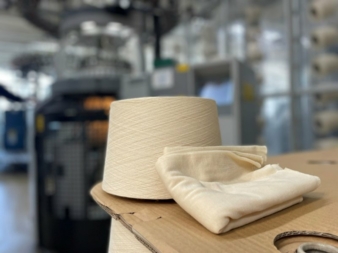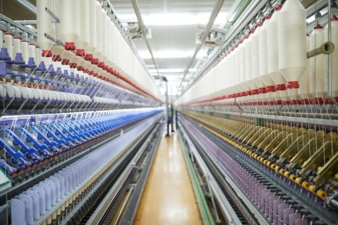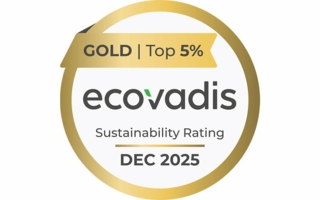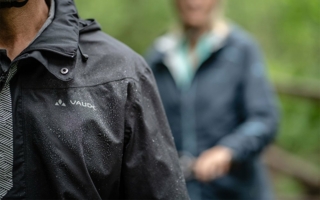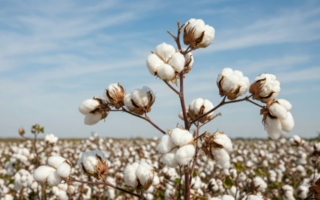10/07/2025 – Sustainable knitted fabrics — auf Deutsch lesen
Local Fabric Makers set things in motion
„Lokalstoffmacher“ (Local Fabric Makers) – that’s Gebr. Otto, Edelweiss Jersey, and Textilveredlung Keller: three family-run companies from Baden-Württemberg in Germany creating locally produced, sustainable, and transparent knitted fabrics.
“We ‘Lokalstoffmacher’ see ourselves as something like a general contractor for locally produced knitted fabrics,” explains Patrick Herter, Managing Director of Edelweiss Jersey and initiator of the project. Grown in Spain, spun by Gebr. Otto in Dietenheim, knitted by Edelweiss in Albstadt, and dyed by Keller in Öschingen – the final fine cotton fabrics from this textile trio of family-run companies in Baden-Württemberg travel no more than 2,300 kilometers in total. But what they “lack” in travel distance, they make up for in transparency, experience, expertise, and a strong sense of responsibility.
All-in-one product solution for garment manufacturers
“I quickly saw the potential for demanding customers,” recalls Patrick Herter, speaking about the beginnings of the Lokalstoffmacher. “On the way back from Dietenheim, I called our finishing partner, Textilveredlung Keller, and told them about ‘Cotton since 1901’.” This is the brand under which Gebr. Otto markets its cotton yarns, made entirely from extra-long staple fibers grown in Andalusia and spun in Dietenheim.
Through the collaboration between Otto, Edelweiss, and Keller, a knitted fabric is created that is local, sustainable, and fully transparent. “While a globally produced knit passes through many anonymous hands, we Lokalstoffmacher could probably list the names and hobbies of everyone involved right on the label,” Herter says with a smile.
“We’ve been working with our fiber supplier in Andalusia for many years,” says Andreas Merkel, Managing Director of Gebr. Otto. “We visit regularly and, together with our partner, we can often assess the expected quality of the raw material during the growing season.” In other words, Otto is deeply connected to the Spanish fiber source.
A spinning mill in the heart of town
Anyone visiting Gebr. Otto’s spinning mill ends up right in the center of Dietenheim – the fine cotton yarn spinner has been based there since 1901. The family-run company is committed to quality, sustainability, and regional production. At the same time, Otto has its sights firmly set on the future: a brand-new machine park, solar-powered rooftops, and yarn innovations like “Cotton since 1901” are all part of the vision. “With that, we offer transparency, sustainability, short distances, and top quality,” Merkel summarizes.
“Somewhere between courage and madness”
“As a producer in Germany, we must stand out through quality,” says Patrick Herter, who took over the family business – founded by his grandparents in 1955 – more than two years ago as the third generation. His decision to continue working in the German textile industry, he admits, lies “somewhere between courage and madness.”
To make this courage pay off, his knitting company in Albstadt – where around 80 circular knitting machines produce fabrics around the clock on weekdays – focuses especially on body size and fine gauges to differentiate Edelweiss products from the standard. The ingredients matter too: “With an average yarn, you only get an average result – and that’s something overseas competition can offer more cheaply.”
That’s why the extra-long staple cotton yarn “Cotton since 1901” is the ideal ingredient from a technical standpoint. Added to that are transparency and a high level of skill and responsibility throughout the process.
No two fabrics are alike
The yarns are delivered to Edelweiss by Otto's own truck – a trip of just under 100 kilometers that takes less than two hours. At Edelweiss, the “Cotton since 1901” yarns – available in counts ranging from 28/1 to 150/1 – can be turned into Single Jersey, Fine Rib, or Interlock, including body size and fine gauges upon request.
The next stop for the raw white fabrics is Öschingen, about 45 truck minutes from Albstadt. The drivers know the way by heart – the partnership between Edelweiss and Keller has “always existed,” says Christian Weiß, Managing Director at Textilveredlung Keller.
The finishers’ job is to turn the knitted fabric into a ready-to-use textile. How complex that is depends on the desired final product, the yarn properties, and prior processing steps. Each article goes through a custom sampling process that can include up to 15 individual steps – ensuring the result exactly matches the customer’s expectations.
“Spinning and the different yarn properties were previously mostly a concern for the knitter,” explains Sebastian Keller, who runs the company together with his cousin Christian Weiß. But the “Lokalstoffmacher” project has shown that transparent, high-quality inputs and the expertise of the three partners really pay off: “We’re increasingly approached by customers with specific fabric requests, like ‘a cotton three-thread fleece in navy blue.’ With the Lokalstoffmacher, we can deliver that locally, sustainably, competently – and on time.”

